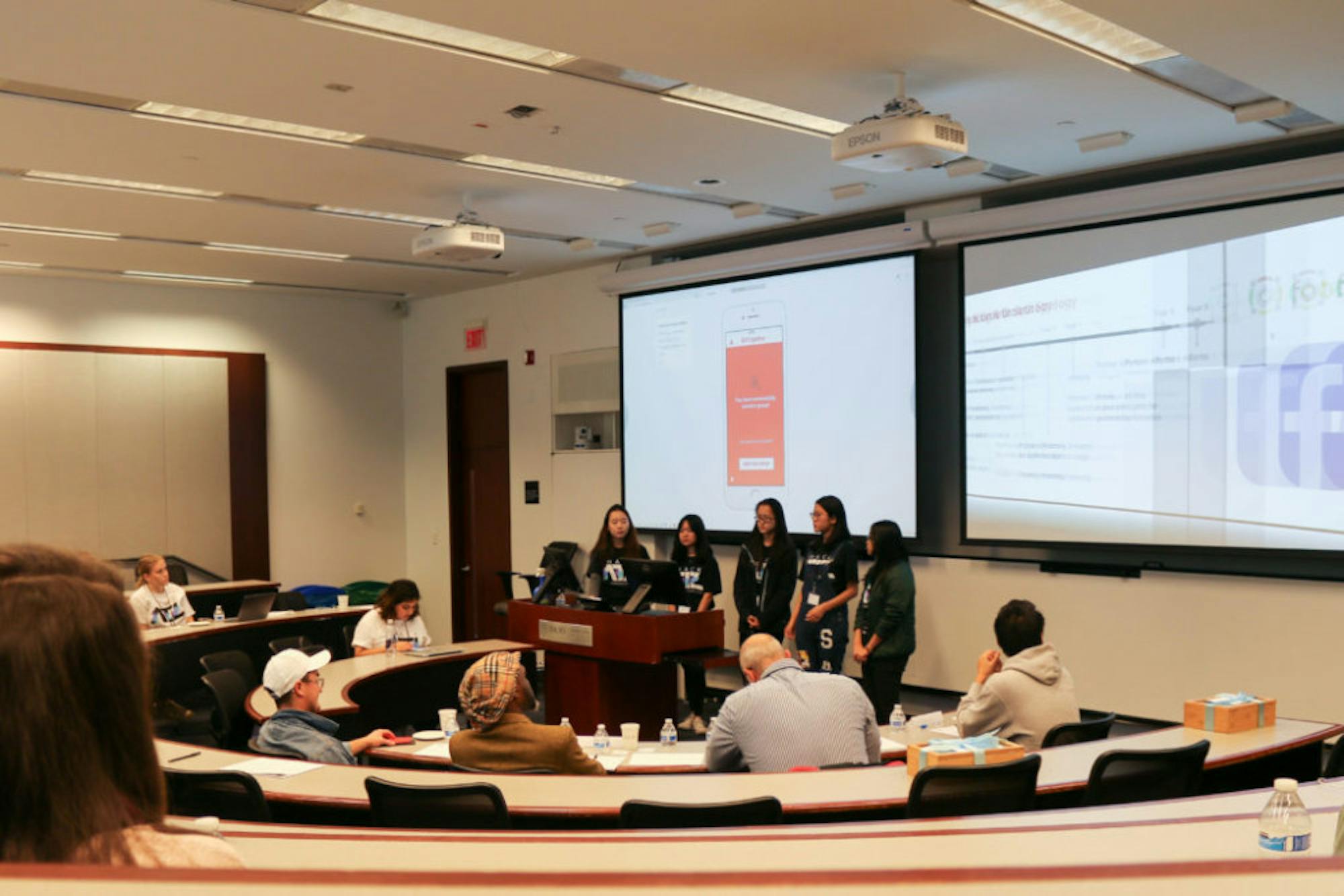
Enthusiastic but bleary-eyed student teams who had been working on developing business ideas for the annual HackATL event pitched their proposals before a panel of five judges on Sunday morning. They’d been brainstorming, designing, discussing and coding for 48 hours, and on Sunday, all their work culminated in a 3 minute and 30 second pitch.
44 teams composed of participants from 20 school participated in the 2018 HackATL, an annual business hackathon hosted by student group Emory Entrepreneurship & Venture Management (EEVM). Participating teams had 48 hours to build a business in one of four categories: emerging technology; health and wellness; social innovation; and arts and entertainment.
The student groups’ business ideas ranged from an app to help users choose trendy outfits to wear to a device that would help in reducing power wastage. Ultimately, “dancEZ,” a team that pitched an app that mirrors and slows down dance tutorials claimed the first prize of $3,000. “Asaga’s” pitch for an e-commerce platform that would help Buddhists make offerings to Buddhist temples took home the second prize of $2,000, while “Reach” won the third prize of $1,000 for their pitch for a platform where college students can obtain help for mental health-related issues anonymously. Each winning team also received $3,140 worth of customer management software from Zendesk, a customer service software company.
On Friday, the first day of the competition, participants mingled with potential teammates. Though some entered the competition with a predetermined team, many came alone and needed to form a group of people with similar ideas.
“The first couple of hours, I just spent going around and talking to everybody to see if they had any ideas, what they were trying to accomplish, what their strengths were,” Melany Silvera (20C) said.
Most teams worked late into Friday night brainstorming ideas, and Silvera’s team was no exception, staying up until 3 a.m.
“It’s really frustrating to not have an idea,” Yara Seif, Silvera’s teammate and freshman at the Georgia Institute of Technology, said. “It’s the first step, but it’s probably the hardest step.”
Silvera’s team, which also included Remi Levinson (18C) and Georgia State University (GSU) sophomore Sara Budeir, pitched a platform called “Buddy” that would enable female college students to connect with each other while walking home at night. The platform, they said, would be especially useful for students at commuter universities such as GSU.
The second day of the competition featured workshops and mentoring sections.
There were three workshops: one on Blockchain Technology by Blockchain Union, a UX 101 workshop conducted by Facebook and a Design Strategy workshop by SunTrust. The workshops showed students what they should take into consideration while building a business.
“After the workshop ... I started understanding the importance of identifying how our company benefits customers from their perspective,” Christopher Kusumonegoro (22C) said. “In the workshop, we went down to the nitty-gritty details of mapping the customer journey, allowing us to see all the steps from how the customer would learn about us to our interactions after completing a sale.”
The founders of several start-up companies held mentoring sessions. Christopher Kusumonegoro (22C) said these mentoring sessions helped teams to approach their project from different perspectives.
“The mentors helped a lot because we would come at this [competition] from a certain … point of view, where we only saw … these certain problems,” Kusumonegoro said. “If we went from a tech [point of view], [the mentors] would view it from a more marketing [perspective].
Seif added that the mentors offered valuable insight as they themselves had recently started new companies.
“It is important to talk to people who work at startups as well because they have lived it [and] they know what it is like,” Seif said. “They’ve been through it recently; they can relate.”
Emory University President Claire E. Sterk attended the final round of pitches and spoke briefly before the groups gave their 12-minute final presentations.
“I am extremely excited that we have this amazing event,” she said in a short speech before the judging began. “Just all the energy, all the creativity, I could not wish for more, because it is the next generation … that is really going to push the boundaries that we have had for many millennia.”
President of HackATL Nancy Guo (19B) said she appreciated Sterk’s words.
“It really shows that after all these years, [the] Emory administration is actually supporting entrepreneurship as a whole,” Guo said. “[The club began because] we didn’t find enough resources for entrepreneurship. So now it's validation from the actual administration that yes, entrepreneurship is important. So, it was a huge milestone for us.”
Though participants were weary by the end of the three days, many relished the competition and felt that it was an insightful learning experience.
“I am not a pre-business major, and honestly, [I] did not realize how hard it can be to make something for a target audience and implement a business [strategy] so that it’s not just you who likes it,” Seif said.
Levinson said he felt that HackATL teaches students to be more versatile and adaptable, and encourages future participants to approach the competition with open minds.
“You shouldn’t limit yourself,” Levinson said. “Just be open to ideas.”
Kusumonegoro, whose team made it to the final round, said that the competition extended beyond just networking — it provided him with intrinsic rewards as well.
“Coming to HackATL, I was really trying to experience some more networking opportunities and meet new people,” he said. “But as we started developing the project and getting really involved … it was really amazing to see how we could actually put this together … Now I feel so accomplished — and empowered.”
Whitney Forbis contributed reporting.
Students Far and Wide Gather for HackATL
Students participating in HackATL in the Social innovation category present to a panel of four judges on Sunday, Oct. 28 at the Goizueta Business School./Tanika Deuskar, Contributing Writer









